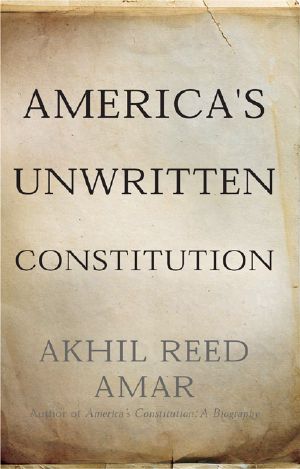America's Unwritten Constitution

- Authors
- Amar, Akhil Reed
- Publisher
- Basic Books
- Tags
- history , politics
- ISBN
- 9780465033096
- Date
- 2012-09-11T00:00:00+00:00
- Size
- 1.79 MB
- Lang
- en
In "America's Unwritten Constitution," esteemed legal scholar Akhil Reed Amar presents an exploration of the various factors that we consider in the course of interpreting the Constitution, but which are not actually enumerated in the written document--and which have never been thoroughly described until now.
With the ratification of the U.S. Constitution, the American people rejected the precedent of the British "Constitution," a set of principles and procedures not based on any one foundational document. Instead, Americans chose to create a single text that would serve as the country's supreme law. But despite its venerated place in our nation's history, the written Constitution alone is inadequate for directing the American system. At a mere eight thousand words, it does not explicitly provide for every question of legality and justice that arises in practice, nor have its subsequent amendments produced an exhaustive list of the many rights and rules that apply to the country's lawmakers, judges, and citizens. As Amar explains, the Constitution was purposefully designed to be a terse document, at once comprehensible to ordinary Americans while also being subtly, ingeniously comprehensive.
In "America's Unwritten Constitution," Amar demonstrates how constitutional interpretation depends as much on implicit values, assumptions, and intuitions about justice and governance as it does on the law spelled out in the document itself. In order to understand the written Constitution, Amar argues, we are ironically required to look between its lines--or even beyond it, to precedents set by our Founding Fathers, to common practices both before and after the Constitution was finalized, and to sources like the "Federalist" papers, William Blackstone's "Commentaries on the Laws of England," the Northwest Ordinance of 1787, Lincoln's Gettysburg Address, and Martin Luther King, Jr.'s "I Have a Dream" speech. These diverse standards, symbols, and documents--along with historical circumstances, cultural mores, and judicial decisions--form our "unwritten" Constitution. They are extensions of the original document, and indispensible tools for understanding and interpreting the written Constitution.
Amar describes each of these "unwritten" sources in turn, revealing the surprising ways in which they guide interpretation of the Constitution itself. The 8th Amendment, for instance, prohibits "cruel and unusual punishments," but offers no definition of "cruel and unusual"--freeing judges to assess sentences based on their conformity with dominant practices at the moment of interpretation. Similarly, while Article I, Section 6 of the Constitution safeguards members of Congress from most forms of punishment for "Speech or Debate in either house," the same holds true for federal judges, whose judicial opinions have historically been protected by the courts despite there being no such assurances in the written Constitution. And it is an unquestioned fact that the president cannot be arrested, imprisoned, or detained while in office--a remarkable guarantee of immunity that is nowhere to be found in the document. Rather, this principle is based on a variety of external factors: arguments in the "Federalist" papers; ratifying debates and early congressional discussions; and the writings of court justices.
"America's Unwritten Constitution" presents a bold new vision of the American constitutional system, one in which proper interpretation of the Constitution rests on the interplay between its written and unwritten manifestations, but in which interpretation does not, and cannot, depend wholly on one form or the other. Neither America's written Constitution nor its unwritten Constitution stands alone, Amar shows, and wi